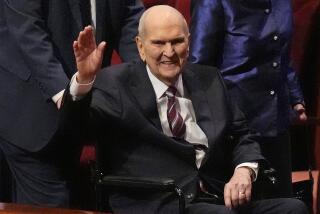Mormons feel rooted and happy, but marginalized, poll finds
Mormons sometimes refer to themselves as a “peculiar people,” a reference to what they believe is a unique covenant with God. Yet as they bask in what has been called the Mormon Moment — and may soon be the Mitt Moment — a new survey suggests that many also hold uncommon views about their place in American life, feeling deeply rooted but outside the mainstream.
Nearly half the Mormons believe they are victims of discrimination, and many feel particular enmity from evangelical Christians, according to the survey released Thursday by the Pew Forum on Religion & Public Life. But the survey also showed that members of the Church of Jesus Christ of Latter-day Saints are among the most happily settled and optimistic of Americans.
And most believe that the United States is ready for a Mormon president.
That may be propitious timing, since former Massachusetts Gov. Mitt Romney appears likely to become the first Mormon nominated for president by a major political party.
Romney’s candidacy, along with that of a fellow Mormon Republican, former Utah Gov. Jon Huntsman Jr., is just one element of what has been dubbed the Mormon Moment: “The Book of Mormon” is the hottest ticket on Broadway. The popular “Twilight” series of books and movies was written by a Mormon author, Stephenie Meyer. And although it didn’t exactly cast the church in the best light, the critically acclaimed TV show “Big Love” was set in the world of a breakaway Mormon polygamist sect.
“One of the key questions we really had going into the survey was, ‘How are Mormons themselves responding to and experiencing this Mormon Moment?’ ” said Greg Smith, a senior researcher at Pew. “It paints kind of a mixed picture.
“On the one hand, we find lots of Mormons telling us they feel like their religion is misunderstood, lots of Mormons who think they’re discriminated against, lots of Mormons who say they don’t think Mormonism is part of mainstream American society,” Smith said. “At the same time, there’s a flip side to this — we see a high level of optimism or satisfaction in their own lives.”
Most of the survey’s findings are unsurprising. Mormons are far more likely to identify themselves as conservative than the public at large (66% versus 37%) and far more likely to be Republican or Republican-leaning (74% versus 45%). They are staunch social conservatives, with strong majorities opposed to homosexuality and abortion. And they support Romney, who has an 86% favorable rating among his coreligionists. (President Obama, by contrast, is viewed favorably by 25% of Mormons, half his rating among the public at large.)
There were, however, findings that, if not exactly surprising to those who follow Mormon affairs, do point to ways in which members of the faith sometimes chart a different path.
For instance, the survey found that Mormons are more moderate on immigration issues than many political conservatives, with a plurality saying that immigrants strengthen America more than they burden it. By contrast, white evangelical voters say by more than a 2-1 margin that immigrants are a burden.
Mormons may be more open to immigration because many serve overseas as missionaries and develop respect for foreign cultures, said David Campbell, a political scientist at the University of Notre Dame and coauthor of “American Grace: How Religion Divides and Unites Us.” Campbell is himself Mormon.
“It’s a community that I think is very cosmopolitan or aware of world culture because of this tradition of missionary service,” he said in a teleconference organized by Pew.
Smith, the Pew researcher, said he was struck by the paradoxical relationship between Mormons and white evangelical Christians. The two groups have a great deal in common: political and social conservatism, very high rates of religious commitment.
“Despite those commonalities, there’s clearly tension between these groups,” Smith said. Half of those surveyed said evangelicals were unfriendly to Mormons — a finding that may be fairly accurate, given that an earlier Pew survey found that 47% of evangelicals said Mormons were not Christians.
That was not the only example of Mormon self-perceptions being in line with reality. For instance, 6 in 10 Mormons say Americans know little if anything about Mormonism — not far from the 50% of the general public who said in a recent survey that they knew nothing or next to nothing about the faith.
For all that, the survey reflected an overall sense of optimism, with 63% of Mormons saying the American public is becoming more accepting of their church and 87% satisfied with their own lives — a far higher percentage than the national average.
The survey was the most extensive ever conducted of American Mormons, according to Allison Pond, deputy editor of the editorial page at the church-owned Deseret News in Salt Lake City and an advisor to Pew on the poll. She said the results largely confirmed what was already known about Mormon beliefs.
Pond said she found it particularly gratifying to see that 86% of respondents said they found polygamy to be morally offensive.
“I’m hopeful that that statistic will start to get some play,” she said. “I think that can tone down a lot of the conversation” about Mormons’ position on polygamy.
Multiple marriage was condoned in the early days of the Latter-day Saints, but has been prohibited by church doctrine since the late 19th century. Despite that, it still is widely associated in the public mind with the Mormon Church.
Pew surveyed 1,019 self-identified Mormons between Oct. 25 and Nov. 16. The survey had a margin of error of plus or minus 4.5 percentage points.
More to Read
Sign up for Essential California
The most important California stories and recommendations in your inbox every morning.
You may occasionally receive promotional content from the Los Angeles Times.










